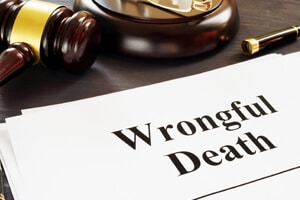What Is a Wrongful Death Claim?
 A wrongful death claim is a civil suit brought when someone dies as the result of another’s negligence or intentional act. Although intentional acts are included, a wrongful death suit is separate from a criminal proceeding, such as a trial for murder or manslaughter. Wrongful death claims don’t seek to punish the defendant through the criminal court but instead seek financial damages from the defendant (or in many cases, the defendant’s insurance company). However, in some cases the same defendant may face both criminal and civil suits – for example, O. J. Simpson was acquitted in a 1995 murder trial for the deaths of Nicole Brown and Ronald Goldman, but their families later sued Simpson in civil court and won.
A wrongful death claim is a civil suit brought when someone dies as the result of another’s negligence or intentional act. Although intentional acts are included, a wrongful death suit is separate from a criminal proceeding, such as a trial for murder or manslaughter. Wrongful death claims don’t seek to punish the defendant through the criminal court but instead seek financial damages from the defendant (or in many cases, the defendant’s insurance company). However, in some cases the same defendant may face both criminal and civil suits – for example, O. J. Simpson was acquitted in a 1995 murder trial for the deaths of Nicole Brown and Ronald Goldman, but their families later sued Simpson in civil court and won.
How is that possible? Murder trials require proving beyond a reasonable doubt that the defendant committed the intentional act leading to the death with malice and premeditation. A wrongful death claim only requires proving that the defendant’s intentional or negligent act led to the victim’s death. This is a lower burden of proof in most cases.
Who Can File a Wrongful Death Claim?
Under North Carolina law, a wrongful death claim can only be filed by the personal representative (an executor or administrator) of the decedent’s estate. The estate has to be opened at the time the suit is filed, so it’s important for interested parties to speak with the personal representative about the possibility of a wrongful death suit before the estate closes. If the deceased person had a will, typically they will have appointed a personal representative in this document. If they died intestate (without a will), the court will appoint one – usually a surviving spouse or other close relative.
In What Situations Can A Personal Representative File a Wrongful Death Claim?
Wrongful death suits are brought in a situation where the deceased would have filed a personal injury claim if they had survived. For example, car accidents are a frequent reason for wrongful death claims. If the decedent was killed by a drunk driver, or another driver who was speeding or otherwise disobeying traffic laws, a wrongful death claim would likely be appropriate. However, these suits can also occur in nearly any situation where the negligence of another led to someone’s death. Depending on the circumstances, this may include incidents where the deceased died as the result of a fire, drowning, workplace accident, plane or train crash, medical malpractice, etc.
Note that the defendant may be a person or entity, and in some cases, a business may be found negligent for someone’s death. For example, if unsafe working conditions led to a person’s death, the personal representative for their estate might consider speaking with an attorney about a wrongful death claim.
What Kind of Damages Are Available in Wrongful Death Cases?
Civil suits can only recover financial damages, but there are still several different kinds of damages the plaintiff might seek in a wrongful death case. These include:
- Funeral or burial expenses
- Medical bills
- Loss of income
- Loss of companionship, comfort, and other benefits of a relationship
- Pain and suffering the decedent sustained before their death
- In some cases, punitive damages intended to punish the defendant
How Is Wrongful Death Proven?
There are many complex laws and statutes regarding wrongful death claims, and your lawyer will be able to answer any specific questions you have about proving your case. However, in general, your attorney will need to prove three things in order to win your wrongful death claim:
- The defendant had a responsibility to take reasonable steps to prevent injury. For example, taking a taxi or ride-share instead of driving home after having too much to drink is a reasonable effort to prevent injury. Putting up a “wet floor” sign after mopping up a spill in the mall food court is another reasonable effort to prevent injury.
- The defendant failed to act reasonably or make reasonable efforts to prevent injury. For example, the defendant drove drunk, or the mall’s janitor didn’t put up a “wet floor” sign after mopping.
- The lack of action or negligence led to the death of the victim. For example, the drunk driver caused a car crash in which the decedent was killed, or a mall customer slipped on the wet floor, hit their head, and died.
If you have questions about whether the estate of a loved one should file a wrongful death claim, talk with the personal representative about contacting Auger & Auger Accident and Injury Lawyers for a free consultation. Our experienced wrongful death attorneys can answer questions and offer guidance on the estate’s potential claim.














